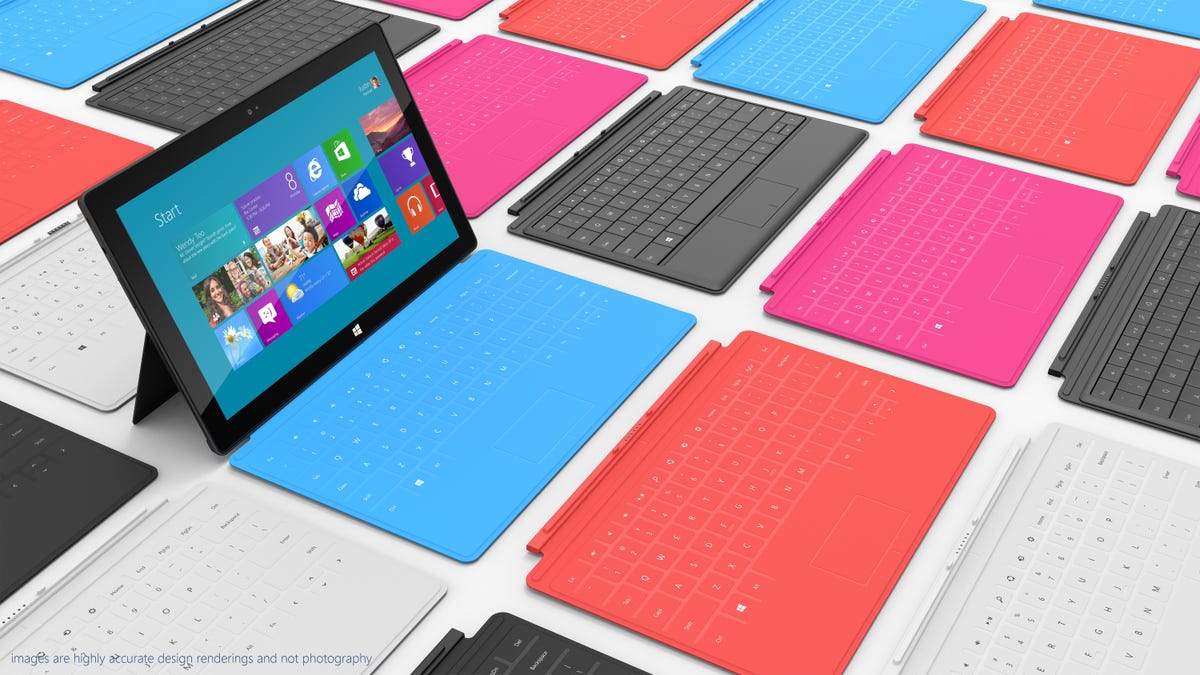With Surface, Microsoft picks a fight with its closest partners
If the newly unveiled Surface tablets are a hit, where will that leave Microsoft's many Windows 8 allies?

You can almost picture Microsoft's longtime hardware partners offering up polite, but terse, applause for the newly unveiled Surface tablets. Most were mum yesterday after the event.
How else are they supposed to react? For companies such as Hewlett-Packard or Acer, which have depended on Microsoft and its Windows operating system for its PCs and laptops, this is a slap in the face.
At best, Microsoft's Surface is implicit commentary that the original equipment manufacturers can't cut it in the tablet arena. At worst, Microsoft means to stake a dominant position, leaving even less room in a business already dominated by Apple's iPad.
"The move is a vote of no confidence in these partners, who should rightly feel slighted...or challenged," said Jan Dawson, an analyst at research firm Ovum.
Here's the kicker: the Surface is actually kind of awesome.
With Microsoft's history of hardware as varied as the Xbox 360 and the Zune, the Surface could have been a hit-or-miss product. But the tablet (which comes in x86 and ARM versions), with a 10.6-inch widescreen display, magnesium case, built-in kickstand, and ultrathin attachable keyboard cover, garnered the kind of excitement and buzz that's commonly found at an Apple event.
That Microsoft decided to enter the tablet market itself underscores the opportunity that comes from the business, as the technology industry begins to acknowledge the so-called "post-PC" era. Rather than let others cannibalize its PC business, Microsoft is showing a willingness to do so itself. The company likely sees the record-setting profits Apple is posting, thanks in part to the iPad, and wants in on the action.
The growth expectations certainly support its enthusiasm. By 2013, nearly half the U.S.'s many millions of Internet users will own a tablet, according to a report from the Online Publishers Association. Nearly a third of users already own a tablet this year, more than double the users from a year ago. While the iPad is still the breakout product in the group, analysts expect it to lose share as alternatives spring up.
Tablets a tough business
The biggest problem with Microsoft's slight against its partners is that the software giant has a point. The tablets in the market -- virtually all of which are admittedly using the Android operating system -- look downright generic.
Commercial success has been elusive for pretty much all of the companies that have entered the tablet arena. As the first Android 3.0 tablet, the Motorola
Many were likely hoping to hop on the Windows 8 bandwagon when that came along, but it's unclear how enthusiastic they'll be with Surface on the horizon.
LG is reportedly putting its tablet initiative on hold as it focuses on its smartphone business. Lenovo and Dell, meanwhile, said they would continue to support Windows 8. Acer and Hewlett-Packard declined to comment. CNET also contacted Samsung and HTC for comment. We'll update the story when they respond.
The companies are likely to stay quiet as they digest the news.
Microsoft told its partners on Friday only that it was coming out with a tablet, according to a person at one of the hardware vendors who spoke on the condition of anonymity. Microsoft shared no specifics, knowing full well that details would leak, robbing Steve Ballmer of his Apple moment.
"We're all taking a wait and see approach," said the vendor contact.
Microsoft is believed to have been eager to move into tablets itself owing to the lackluster results from Nokia on the smartphone side, according to Sterne Agee analyst Shaw Wu.
Partners in a bind
Microsoft is emulating Apple in its move to the integrated device business. The Surface is a marriage of the company's Windows 8 and hardware it designed.
Microsoft isn't the only one looking to offer its own tablet. Google is widely expected to unveil its own branded tablet at its Google I/O developer conference next week. Similar to its Nexus line of smartphones, Google will likely hold up a "Nexus" tablet as a model for the latest version of its Android operating system.
Microsoft Surface tablet debuts (roundup).
With Google and Microsoft getting into tablets themselves, and Apple already perched atop the totem pole, the other companies could find themselves squeezed.
It's unclear what the vendors will do. Samsung Electronics' new CEO, Kwon Oh-hyun, has called for the company to focus on developing its own software to differentiate itself. Many will likely begrudgingly stick with Windows 8 and Android and attempt to compete against their partners.
Don't be fooled by the generic comments of support expressed by some of the partners; the companies are likely concerned.
Lighting a fire
The flip side to the Surface as a competitor is the product as a catalyst for the development of new products. Microsoft could be looking to light a fire under its partners, pushing them to move beyond past generic attempts and toward more innovative designs and features.
"It would be good for (the hardware partners) to argue that Microsoft is unproven in hardware, so consumers and enterprises should buy the hardware from (original equipment manufacturers) that know what they're doing, using Microsoft's great software," Dawson said.
Microsoft's Surface could finally break the iPad lock and get people thinking about Windows 8 as a platform for tablets, which could open the door for other vendors. At least one OEM partner is holding out a bit of hope for that scenario.
The companies are likely hesitant to react too quickly because Microsoft, in typical fashion, didn't provide too many details beyond the device itself. There's no specific information on when the product will launch or how much it costs.
Judging by yesterday's reaction, consumers will be eager for Microsoft to fill in those details. The hardware partners can't be anywhere near as excited.
CNET's Paul Sloan contributed to this report.

